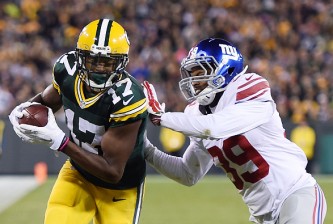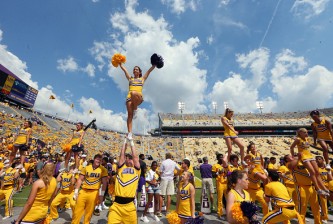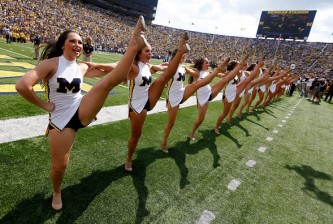Just coming out today, a joint Sports Illustrated/CBS News investigation into the preseason college football Top 25 finds that 1 in every 14 player has been arrested and of those, nearly 40% were for serious offenses. That’s pretty alarming. And of the schools that recruited players, only two of the Top 25 bothered to conduct background checks. This story was unveiled during CBS’ The Early Show today. Unfortunately for CBS and SI, it was up against a live Charlie Sheen interview on Today on NBC so not too many people saw it. The good thing is that the story is out in this week’s issue of Sports Illustrated and on its website.
We have details of the investigation which brings CBS News reporter Armen Keteyian back to his SI roots. Reading the first part of the story, to see how many programs fail to check their recruits is just amazing, but then again, where does the responsibility lie? With the coaches? With the administrators? With the parents? The high schools? Let’s take a look at what SI has in store with this story.
Special report: Criminal Records in College Football – A SPORTS ILLUSTRATED/CBS NEWS INVESTIGATION REVEALS AN ALARMING NUMBER OF STUDENT-ATHLETES AT TOP COLLEGE FOOTBALL PROGRAMS HAVE CRIMINAL RECORDS
Six-Month Investigation Into The Backgrounds Of The 2,837 Student-Athletes Who Comprised The Rosters of SI’s 2010 Preseason Top 25 Revealed That 7% Have Criminal Records & Nearly 40% Of The Alleged Offenses Were Serious Crimes
Just Two of the 25 Schools Investigated Conduct Any Type of Background Checks of High School Recruits
NEW YORK, NY (3.2.11) – A six-month Sports Illustrated/CBS News investigation into the criminal backgrounds of 2,837 student-athletes who comprised the rosters of SI’s 2010 preseason top 25 revealed that 7% (1 in every 14) have police records and nearly 40% of the alleged offenses were serious incidents. Equally as eye-opening, just two of the 25 schools conducted any type of regular criminal background checks of potential high school recruits, while none of the schools searched juvenile records.
A detailed analysis of the investigation’s findings – culled from more than 7,000 record checks – along with comments and reaction from the NCAA, several head coaches including Jim Tressell, Jimbo Fischer, Rick Neuheisel and Gary Patterson can be found in a Special Report: “Criminal Records in College Football” which appears in this week’s Sports Illustrated with additional coverage on CBS News’ “THE EARLY SHOW” THE CBS EVENING NEWS WITH KATIE COURIC www.CBSNews.com and www.SI.com, beginning today. The joint investigative team included George Dohrmann and Jeff Benedict, and special reporting from Andy Staples, Armen Keteyian, Michael McKnight, Michael McCann, Jeffrey Gasser and Emily Rand. The package was edited by B.J. Schecter. Some of the investigation’s findings include:
- Players had been charged with 56 violent crimes, including assault and battery (25 cases), domestic violence (6), sex offenses (3), aggravated assault (4) and robbery (4). There were 41 charges for property crimes, such as burglary, theft and larceny; and 105 for drug and alcohol offenses, including DUI and intent to distribute cocaine.
- Players were guilty or paid a penalty in about 60% of the 277 total cases that have a known outcome.
- If the study had looked at only scholarship players, the percentage of players with a criminal record would have risen to 8.1% (172 of 2,125)
The background checks were done through 31 state or local courts, 16 court databases, 25 police departments or prosecutors’ offices, 20 Freedom of Information Act Requests, The Florida Department of Law Enforcement and a private investigator. Most players were checked through several sources. The reporting also included more than 150 interviews with law enforcement officials, defense lawyers, players, victims, witnesses, high school and college coaches, NCAA officials and other experts.
When presented with the study’s results, NCAA President Mark Emmert said, “[It is] a set of facts that obviously should concern all of us.?.?.?. Seven percent, that’s way too high. I think two percent is too high. You certainly don’t want a large number of people with criminal backgrounds involved in activities that represent the NCAA.”
How much programs know about high school recruits is a focal point of the special report “Criminal Records in College Football” and it is surprising just how little coaches know about the students they recruit. Only two of the schools among SI’s preseason top 25, TCU and Oklahoma, perform any type of background check of student-athletes prior to offering a scholarship, while none of the schools review juvenile records. TCU was the only University among SI’s preseason top 25 with zero athletes who had a police record. Stanford University had one athlete cited for a minor offense. The University of Pittsburgh had 22 players with a police record, more than three times the rate of the other 24 schools. The breakdown is as follows:
- Pittsburgh 22; Iowa/Arkansas 18; Boise State/Penn State 16; Virginia Tech 13; Oklahoma/Wisconsin/Florida State 9; Miami 8; Florida/Ohio State/Oregon/USC 7; Alabama/Cincinnati/North Carolina /Utah 5; Georgia Tech/Nebraska/Oregon State;. LSU/ Texas 2; Stanford 1; TCU 0
- Of the 318 athletes SI/CBS News investigated who are from Florida, the only state that allows complete access to juvenile records, 22 were found to have been arrested at least once before they turned 18. If that rate were extrapolated to the entire pool of players in the study, it would mean that approximately six scholarship players per team had been arrested at least once before they arrived on a college campus.
Florida State coach Jimbo Fisher, whose top-ranked 201 recruiting class included 21 prospects from in-state, was asked why the Seminoles don’t do criminal background checks. “We have people in the community who know people,” Fisher said. “Everybody knows law enforcement people. We know people who are around guys.”
One option as suggested in the report is conference mandated background checks something Keteyian discussed with several coaches at the American Football Coaches Association’s Annual Conference earlier this year. Said Neuheisel “I think that would be the way to do it… That protects the individual institutions. It also serves as a deterrent for young people to stay on the straight and narrow. I think it’s a great idea.”
Richard Lapchick, founder of the Center for Sports and Society and president and CEO of the National Consortium for Academics and Sports at the University of Central Florida said of the report: “This sounds an alarm bell that some new policies are going to have to be developed on individual campuses or at the national level to take a closer look at who we’re recruiting… With the results of this investigation, I think it’s almost incumbent on all those universities who play at this level to do criminal background checks on the people they’re recruiting. Not only for the nature of the football program itself, but for public safety on campus.”
Certainly an eyeopening story. We’ll see if there’s any reforms that come from the investigation. That is it for now.























